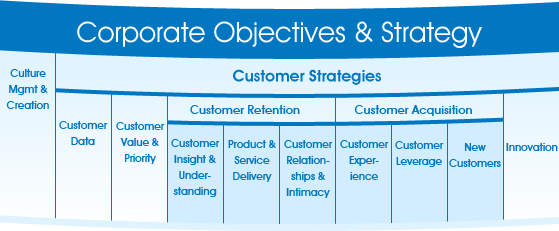CCO Road Map
Introduction
In mid-2009, some of the most forward-thinking Chief Customer Officers (CCOs) gathered together to create the first-ever Chief Customer Officer Roadmap, intended to help simplify the sometimes overwhelming complexity of the CCO role. The role is still relatively new, and best practices around loyalty remain scarce. Based on the best practices of veteran CCOs and members of the Chief Customer Officer Council, the Roadmap provides a prioritized framework to help CCOs and other loyalty executives to drive solid business results as they acquire and retain more profitable customers. By following the Roadmap, the executive can implement tried-and-tested programs without the risk of experimenting at the customers’ expense, and can shave years off the time required to achieve major customer strategies.
The Role of the Chief Customer Officer
As defined at the 2009 Chief Customer Officer Summit, CCOs may be known by many titles, but the CCO is “An executive that provides the comprehensive and authoritative view of the customer and creates corporate and customer strategy at the highest levels of the company to maximize customer acquisition, retention, and profitability.”
 In the broadest terms, the CCO is responsible for profitably aligning the company’s deliverables with strategic customer needs and values. To do so, the CCO follows an iterative process of understanding critical customer issues and goals, assessing the business and customer impact, and (re-) aligning the company deliverables and processes to meet them.
In the broadest terms, the CCO is responsible for profitably aligning the company’s deliverables with strategic customer needs and values. To do so, the CCO follows an iterative process of understanding critical customer issues and goals, assessing the business and customer impact, and (re-) aligning the company deliverables and processes to meet them.
The Chief Customer Officer Roadmap
To ensure success in the process of (re-) aligning, the Chief Customer Officer needs to have a plethora of tools available, and the Chief Customer Officer Roadmap captures these tools and activities. In addition, it provides a general priority order, enabling CCOs to focus on the most important activities first and over time, broaden their horizons to best serve customers, their companies, and defend their value.
Roadmap Summary
Within this Roadmap there is a loose, top to bottom and left-to-right progression.

The Chief Customer Officer’s actions are driven by corporate strategy, and successful CCOs understand that this critical alignment, coupled with vocal and visible support from the executive team are key ingredients to his or her success.
There is some debate as to whether “Culture Management and Creation” or “Customer Data” should be the first focus of the CCO. There is no debate, however, as to the importance of understanding and adapting culture to become more customer-centric.
Within each business unit, product line, or customer segment, there may be a unique “Customer Strategy” that drives data collection, retention/acquisition strategies, and the form that innovation takes. For small companies, there may be only a single customer strategy whereas there may be many in larger companies. However, as Bob Olson said, it is important that there be consistency in the customer experience to present to the customer a unified and consistent whole.
As the ultimate authority on the customer, CCOs rely heavily upon customer data to execute and refine corporate & customer strategy. The challenge is to do so in such a way that customers are not overwhelmed in the collection and with allowances for imperfect data. One of the greater values of the CCO is his/her ability to gather and interpret in an unbiased fashion.
Many CCOs in larger companies spend the greatest percentage of their time in the “Customer Insight & Understanding” and “Product/Service Delivery” sections of the roadmap. In many companies, the greatest opportunities for improvement are found herein.
Once the more glaring issues are resolved, CCOs can move towards “Customer Relationships & Intimacy” where they begin to develop close customer relationships that enhance loyalty and enable greater customer insight and understanding, as well as implement specific winback or crisis management programs and others to solidify or rescue relationships.
As relationships and customer insight improve, so does your success in “Customer Leverage” and “New Customers”. Armed with insight, CCOs can further account penetration, leverage existing customers to find new ones through reference programs, and leverage insights about customers to find new prospects with similar attributes, characteristics, and needs.
Innovation is an inevitable outcome of this progression. CCOs find that loyal customers share business plans, product roadmaps, and potential competitive threats. CCOs can refine and introduce new products and services in anticipation of changing customer and marketplace needs.